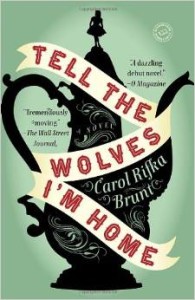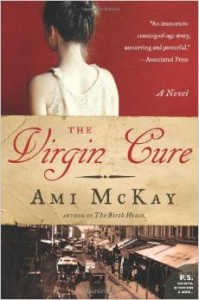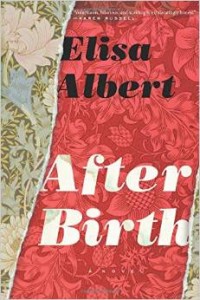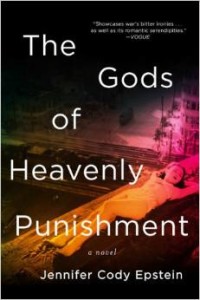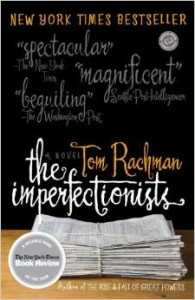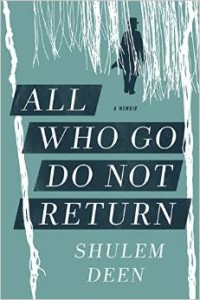Here are my latest recommendations. This is particularly strong group of books. I hope you’ll find them worthwhile reads as well.
The Guest Book by Sarah Blake @@
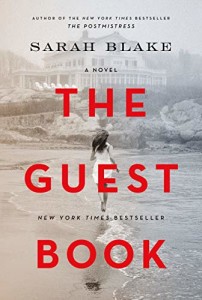 This is a story about a family, but also about a country, told over several generations. The Miltons are blueboods, the bedrock of America. They are the definition of privilege and noblesse oblige. Civility and honor are prized, along with knowing one’s place – the assumption being that a everyone should know their place and act accordingly. The family patriarch buys an island in Maine in the years preceding World War II, which is the backdrop to much drama and a deeply buried mystery which later gets unearthed by a granddaughter trying to make sense of the past. Blake does a magnificent job depicting the different generations, their relationships to each other, and their experiences of both the island and the family legacy. The island itself comes beautifully to life through the seasons and over the years, with incredibly gorgeous detail of the sea and local plant life and the items in the kitchen and in the bedrooms, the clothes that the characters wear and what each generation is drinking, so that the place itself a main character in this compelling tale. She expertly weaves together the threads of this story that are both highly personal to the Milton family, and also contain reverberations of American history and changing national mores. The personal is truly political here, even as individual family members try over the generations to cover up their complicity. But truth seeps out of the cracks of even carefully constructed lies and omissions, and is eventually uncovered.
This is a story about a family, but also about a country, told over several generations. The Miltons are blueboods, the bedrock of America. They are the definition of privilege and noblesse oblige. Civility and honor are prized, along with knowing one’s place – the assumption being that a everyone should know their place and act accordingly. The family patriarch buys an island in Maine in the years preceding World War II, which is the backdrop to much drama and a deeply buried mystery which later gets unearthed by a granddaughter trying to make sense of the past. Blake does a magnificent job depicting the different generations, their relationships to each other, and their experiences of both the island and the family legacy. The island itself comes beautifully to life through the seasons and over the years, with incredibly gorgeous detail of the sea and local plant life and the items in the kitchen and in the bedrooms, the clothes that the characters wear and what each generation is drinking, so that the place itself a main character in this compelling tale. She expertly weaves together the threads of this story that are both highly personal to the Milton family, and also contain reverberations of American history and changing national mores. The personal is truly political here, even as individual family members try over the generations to cover up their complicity. But truth seeps out of the cracks of even carefully constructed lies and omissions, and is eventually uncovered.
Confessions of the Fox by Jordy Rosenberg @@@
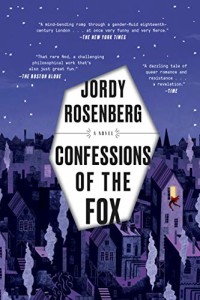 A conceptual novel if ever there was one, for most of the time I was reading this I couldn’t decide if it was brilliant or insane, or both. Based on the life of historical characters from 18th century London, Jack Sheppard, a reknown thief and jailbreak, and Edgeworth Bess, a famous prostitute, this novel is a combination of different styles, narratives, and narrators. It is about as queer a novel as is possible, dealing with queer identity and also breaking down boundaries about writing and novels and fiction, and so much more. Ostensibly, this volume is a research project being undertaken by a professor, Dr. Voth, whose career is shaky at best and whose heart has recently been broken. The reader comes to understand that the professor is trans, and that there is much going on in the Dr. Voth’s life beyond this project. The book is divided into two parts. One is a longlost autobiographical manuscript containing the story of Jack Sheppaard and Edgeworth Bess. The manuscript, which may or not be a hoax, reveals heretofore unknown information including that Sheppard had been born a girl, and other ways in which both were masters of gender-transformation and barrier-breakers. The other part of the book are Dr. Voth’s footnotes on the manuscript, which both comment on the manuscript, and within those margins also begin to shape a narrative about the professor’s own life and reality. If this sounds like a dizzying journey, it is. But it is well worth it. This boundary-pushing book is a delicious delight, at times quite funny and at other times heartbreaking. And, yes, it is absolutely brilliant.
A conceptual novel if ever there was one, for most of the time I was reading this I couldn’t decide if it was brilliant or insane, or both. Based on the life of historical characters from 18th century London, Jack Sheppard, a reknown thief and jailbreak, and Edgeworth Bess, a famous prostitute, this novel is a combination of different styles, narratives, and narrators. It is about as queer a novel as is possible, dealing with queer identity and also breaking down boundaries about writing and novels and fiction, and so much more. Ostensibly, this volume is a research project being undertaken by a professor, Dr. Voth, whose career is shaky at best and whose heart has recently been broken. The reader comes to understand that the professor is trans, and that there is much going on in the Dr. Voth’s life beyond this project. The book is divided into two parts. One is a longlost autobiographical manuscript containing the story of Jack Sheppaard and Edgeworth Bess. The manuscript, which may or not be a hoax, reveals heretofore unknown information including that Sheppard had been born a girl, and other ways in which both were masters of gender-transformation and barrier-breakers. The other part of the book are Dr. Voth’s footnotes on the manuscript, which both comment on the manuscript, and within those margins also begin to shape a narrative about the professor’s own life and reality. If this sounds like a dizzying journey, it is. But it is well worth it. This boundary-pushing book is a delicious delight, at times quite funny and at other times heartbreaking. And, yes, it is absolutely brilliant.
A Place for Us by Fatima Farheen Mirza @@@
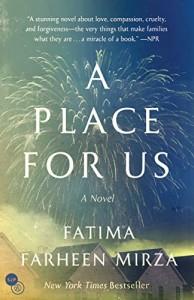 My first thought upon recalling the experience of reading this book is simply to take a deep breath. There is a reverence to this book, a deep respect for the tradition out of which this story comes. In many ways, this book belongs to a genre of stories of immigrants to the United States, with generational differences causing friction between parents and children and struggles over identity and belonging. Within that genre there is a sub-genre to which it belongs as well, the stories of immigrant families from India, with all the particulars of those stories. And while this particular book does belong to that genre and sub-genre, it is so much more. As the family gathers for a wedding, their love for each other comes to the surface along with secrets, anger, and hurts. As the narrative moves from the present to the past, and then into the future, betrayal after betrayal is revealed, and the scars become visible. Yet with all the drama, there is an understated stillness and quietude that threads through the complexity of this family story. Their Muslim faith is in the forefront of their behavior; their beliefs and theology is described in loving ways that allow for struggle and engagement rather than serving as a mere descriptive element. They want to be people of faith, and they are sustained by their faith, even as they worry about not living up to its highest aspirations. I found their struggle to be deeply moving, and the level of complexity with which they struggled to be quite compelling.
My first thought upon recalling the experience of reading this book is simply to take a deep breath. There is a reverence to this book, a deep respect for the tradition out of which this story comes. In many ways, this book belongs to a genre of stories of immigrants to the United States, with generational differences causing friction between parents and children and struggles over identity and belonging. Within that genre there is a sub-genre to which it belongs as well, the stories of immigrant families from India, with all the particulars of those stories. And while this particular book does belong to that genre and sub-genre, it is so much more. As the family gathers for a wedding, their love for each other comes to the surface along with secrets, anger, and hurts. As the narrative moves from the present to the past, and then into the future, betrayal after betrayal is revealed, and the scars become visible. Yet with all the drama, there is an understated stillness and quietude that threads through the complexity of this family story. Their Muslim faith is in the forefront of their behavior; their beliefs and theology is described in loving ways that allow for struggle and engagement rather than serving as a mere descriptive element. They want to be people of faith, and they are sustained by their faith, even as they worry about not living up to its highest aspirations. I found their struggle to be deeply moving, and the level of complexity with which they struggled to be quite compelling.
Lost Children Archive by Valeria Luiselli @@@
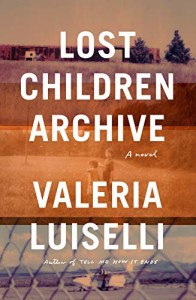 Read this book. Now. Run, don’t walk. This Man Booker Longlisted novel is both urgently of the moment, and achingly timeless. A patched together family of unnamed members, a mother, a father, a daughter and a son, get in a car to drive across America. It is in some ways an epic American road novel of discovery, myth-making, and in this case also myth-breaking. The parents are both involved professionally in recording sounds for the purposes of creating stories and documentaries, though their particular interests are in different areas. The mother, spurred by her distress about lost children in the midst of the current refugee and immigration crisis, is determined to tell a story about what is happening with children currently trying to enter this country. The father wants to tell the story of the Apache, to examine the reality versus the myth of what happened to the people who were the original inhabitants of this land and for whom we are the ones who came, uninvited and unwelcome. This is a story about the history and future of a particular family, and it is a story about a the history and future of this country. It is heartbreaking, and gorgeously written, with a kind of poetic repetitive beat that drives the narrative even at its most quotidian. But wait – there’s more. The story is told from several points of view, and includes lists, and so many names of books and writers, and a story within the story, and descriptions of photographs, and sounds, so many sounds and echoes of sounds that it feels like a multi-sensory experience as well as one of those never-to-be-forgotten interdisciplinary college classes that dizzyingly ties everything together in ways formerly unimaginable. A wise friend recommended that I listen to the book rather than read it, something I almost never do with fiction, but I listened to her advice and now I understand why. So that’s my recommendation as well – this is a book to listen to. Try it and you’ll see why.
Read this book. Now. Run, don’t walk. This Man Booker Longlisted novel is both urgently of the moment, and achingly timeless. A patched together family of unnamed members, a mother, a father, a daughter and a son, get in a car to drive across America. It is in some ways an epic American road novel of discovery, myth-making, and in this case also myth-breaking. The parents are both involved professionally in recording sounds for the purposes of creating stories and documentaries, though their particular interests are in different areas. The mother, spurred by her distress about lost children in the midst of the current refugee and immigration crisis, is determined to tell a story about what is happening with children currently trying to enter this country. The father wants to tell the story of the Apache, to examine the reality versus the myth of what happened to the people who were the original inhabitants of this land and for whom we are the ones who came, uninvited and unwelcome. This is a story about the history and future of a particular family, and it is a story about a the history and future of this country. It is heartbreaking, and gorgeously written, with a kind of poetic repetitive beat that drives the narrative even at its most quotidian. But wait – there’s more. The story is told from several points of view, and includes lists, and so many names of books and writers, and a story within the story, and descriptions of photographs, and sounds, so many sounds and echoes of sounds that it feels like a multi-sensory experience as well as one of those never-to-be-forgotten interdisciplinary college classes that dizzyingly ties everything together in ways formerly unimaginable. A wise friend recommended that I listen to the book rather than read it, something I almost never do with fiction, but I listened to her advice and now I understand why. So that’s my recommendation as well – this is a book to listen to. Try it and you’ll see why.
Unsheltered by Barbara Kingsolver @
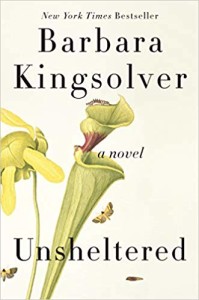 I love Barbara Kingsolver’s writing but this should have been a better book. I don’t regret reading it. But it seemed as if, because Kingsolver is such a successful author, that it didn’t get the editing it should have gotten. The concept is great. There are two parallel stories occurring in the same place, a century apart, in Vineland, New Jersey. Kingsolver has great material to work with here – Vineland has an interesting history. But the story felt too forced and too much in service about making a point about the state of the world in which we’ve found ourselves today, and the dire consequences that we will facing shortly if we don’t change our ways. In both stories. a literal house and a way of life are falling apart. Can either be saved is the question asked in both stories, and the answer is not a good one in either. But the stories are filled with interesting characters and possibilities for transformation, moments of aching tenderness and beautiful descriptions of nature. All of that made it possible to get through a book that desperately needed to be shorter and sharper.
I love Barbara Kingsolver’s writing but this should have been a better book. I don’t regret reading it. But it seemed as if, because Kingsolver is such a successful author, that it didn’t get the editing it should have gotten. The concept is great. There are two parallel stories occurring in the same place, a century apart, in Vineland, New Jersey. Kingsolver has great material to work with here – Vineland has an interesting history. But the story felt too forced and too much in service about making a point about the state of the world in which we’ve found ourselves today, and the dire consequences that we will facing shortly if we don’t change our ways. In both stories. a literal house and a way of life are falling apart. Can either be saved is the question asked in both stories, and the answer is not a good one in either. But the stories are filled with interesting characters and possibilities for transformation, moments of aching tenderness and beautiful descriptions of nature. All of that made it possible to get through a book that desperately needed to be shorter and sharper.
Rating System
©©© – Amazing Book, dazzling, outstanding, blew me away
©© – Great Book, deeply satisfying, loved it
© – Good Book, but I wanted it to be even better

